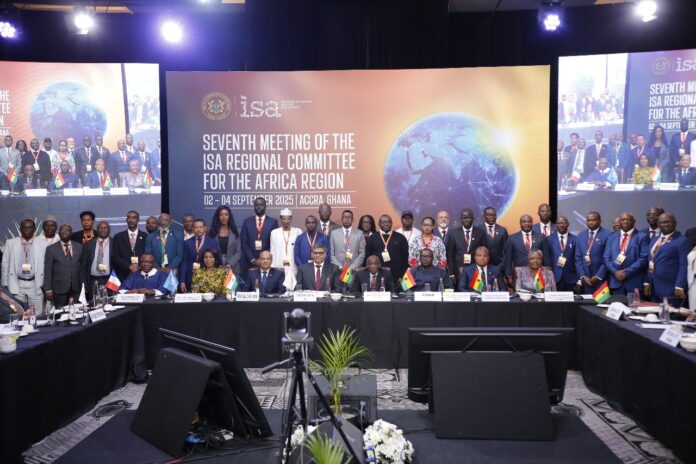The International Solar Alliance (ISA) has launched a $200 million Africa Solar Facility in Accra to boost investment in solar energy across the continent. The fund, managed by Africa50, is designed to de-risk projects and mobilise more than 20 times its value in private capital.
Nigeria’s Sovereign Investment Authority (NSIA) has already pledged between $100 million and $150 million, with the facility expected to be operational by the end of the year.
Also Read: Mahama to relaunch Sanitation Day to restore discipline in public spaces
The launch was the headline outcome of the Seventh Meeting of the ISA Regional Committee for Africa, held in Accra on Wednesday, September 3, and chaired by Ghana’s Energy and Green Transition Minister, John Abdulai Jinapor.
ISA Director General Ashish Khanna, in his inaugural address, emphasised that access to energy is a fundamental human right and pointed out the significant gap in clean energy investment in Africa compared to global standards.
He said, “This facility is a game-changer for Africa’s solar future. By leveraging catalytic finance, we can unlock billions in private sector funding and deliver clean energy to millions. Our strategy is about moving from ambition to action.”
Mr John Abdulai Jinapor, the Minister of Energy and Green Transition and chair of the meeting, noted that a new financing tool is vital for bridging the continent’s vast energy gap.
According to him, about 600 million people in Africa still live without electricity. “The Africa Solar Facility offers the means to transform pipeline projects into bankable ones and attract private capital to make them real,” he said.
Other major announcements included: Country Partnership Frameworks (CPFs): Ghana, Nigeria, and The Gambia formalised CPFs with ISA to align solar policies with national goals, focusing on rooftop systems, community mini-grids, and agriculture-driven applications; Solar for Agriculture: Expanded solar irrigation and cold storage initiatives were unveiled, aimed at boosting food security, cutting Africa’s $400 billion annual food import bill, and creating rural jobs; Digital Transformation: ISA announced new AI-driven tools and digital twins of power distribution systems to cut inefficiencies, lower costs, and improve the reliability of energy supply; and Mission 300 Alignment: ISA aligned with Mission 300, a programme backed by $48 billion in concessional funding to electrify 300 million Africans.
UN Energy Envoy Damilola Ogunbiyi urged Africa to also mobilise its own resources to accelerate the transition. “Sovereign wealth funds, pension funds, and local banks hold the capital to finance distributed renewable energy projects. Governments must streamline licenses and tariffs to unlock private sector participation,” she urged.
France’s Ambassador to Ghana, Jules Armand Beaussieux, pledged continued French investment, while India’s High Commissioner Manish Gupta highlighted India’s “One Sun, One World, One Grid” vision as a shared blueprint for clean energy access.
Economic adviser to President Mahama, Seth Terkper, acknowledged that with nearly 60% of the world’s best solar resources, Africa can leapfrog traditional energy pathways and become a global leader in distributed renewables.”
The Accra meeting brought together 39 African member states of the ISA alongside development partners, underscoring a renewed push to accelerate solar deployment and deliver energy equity across the continent.


